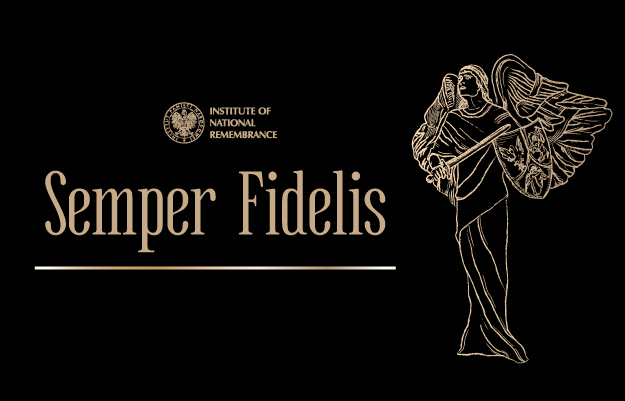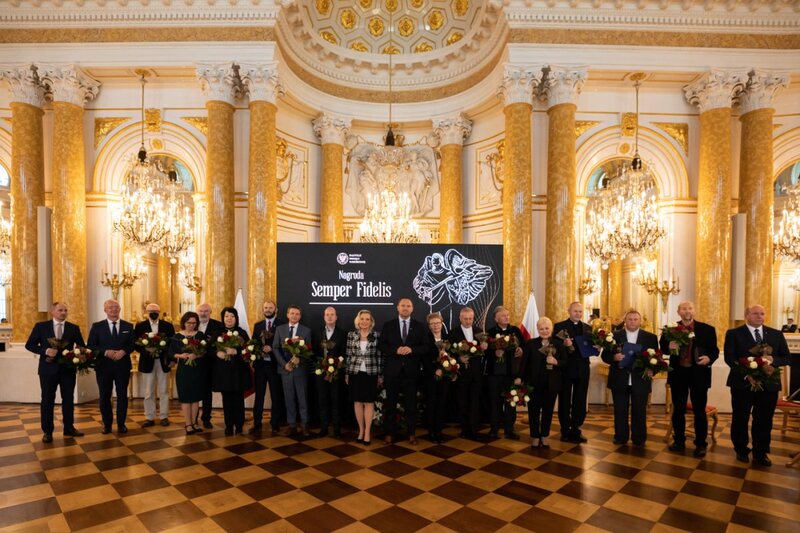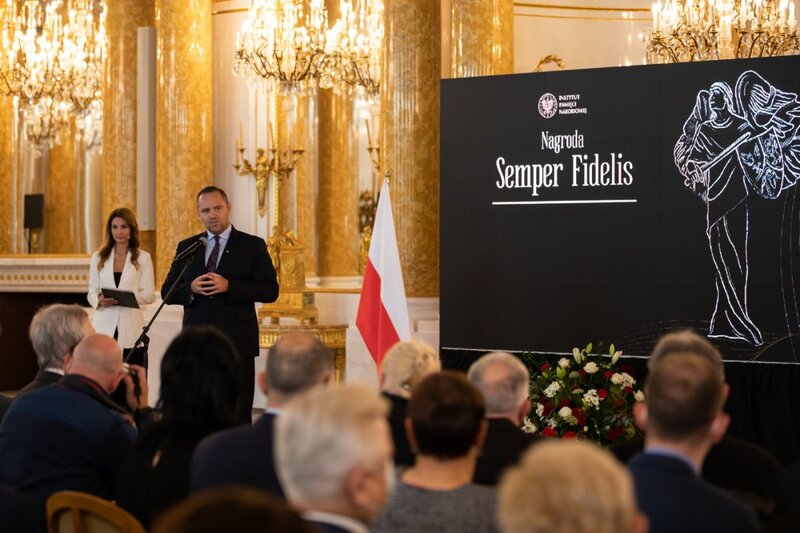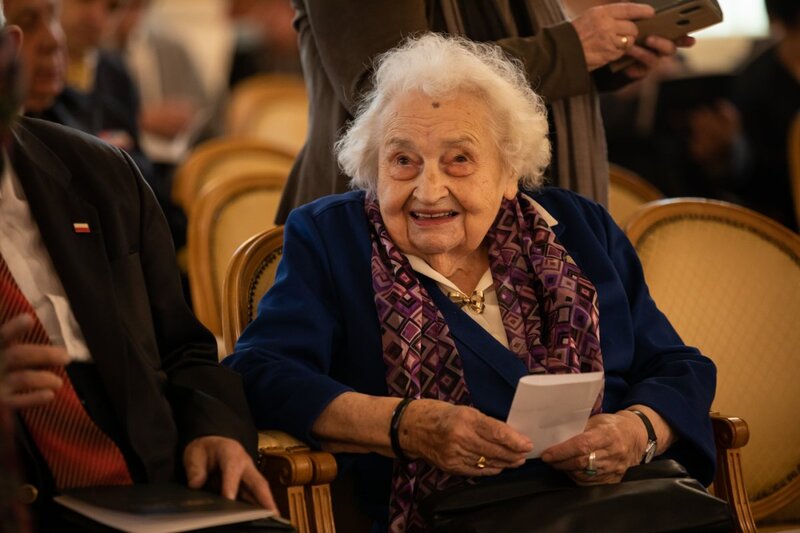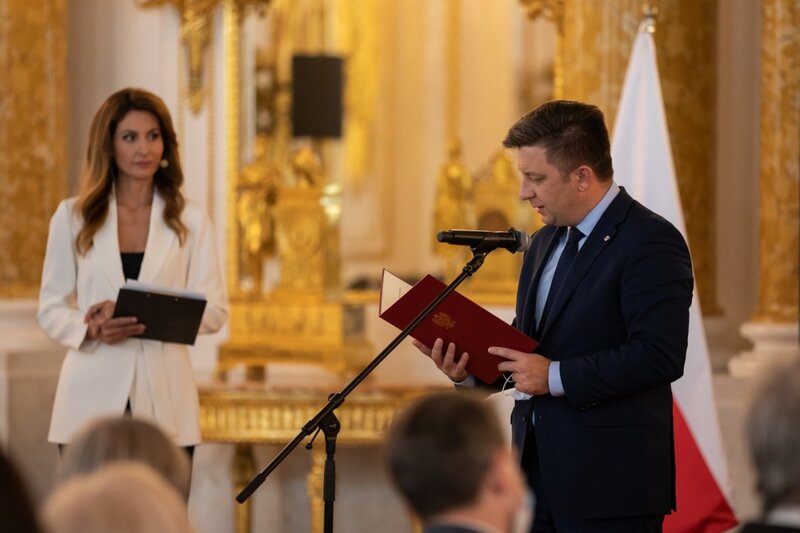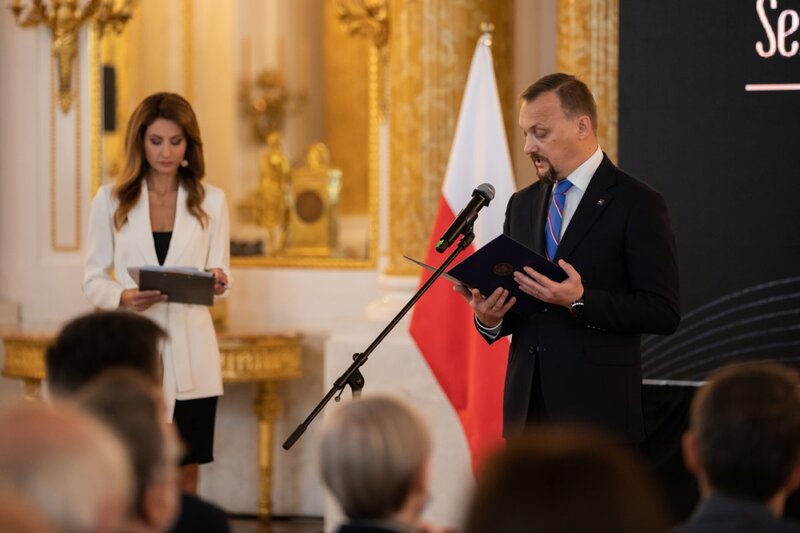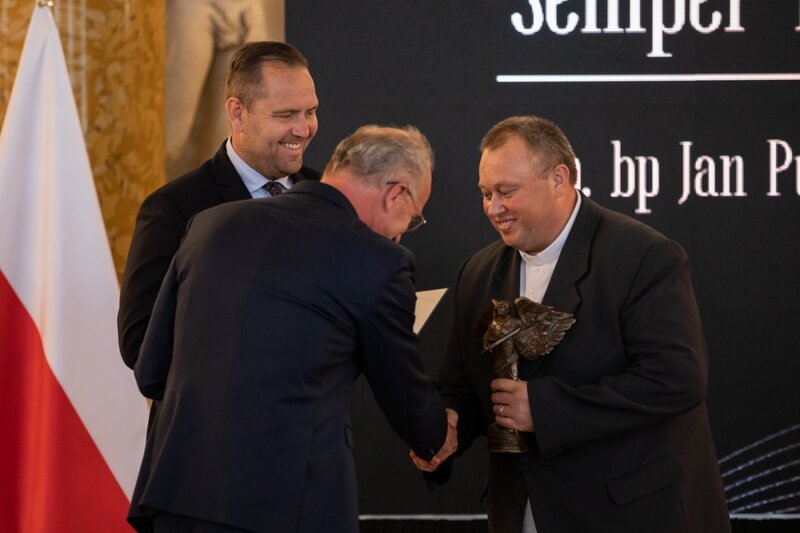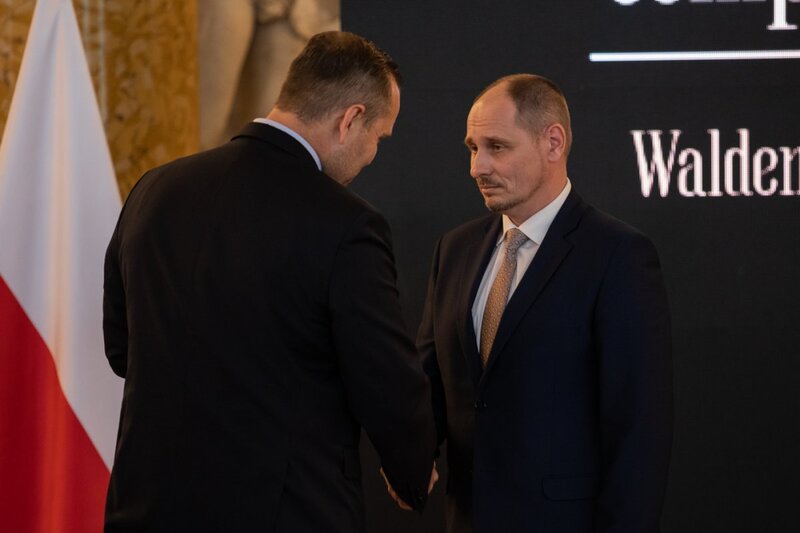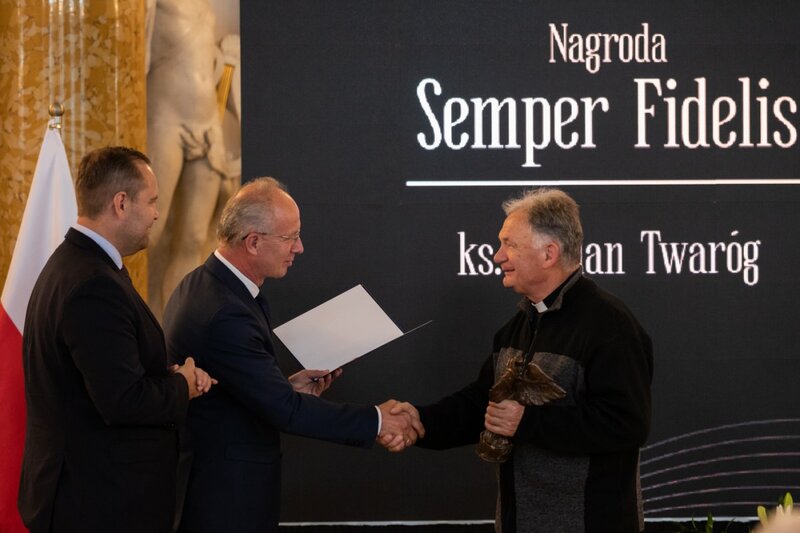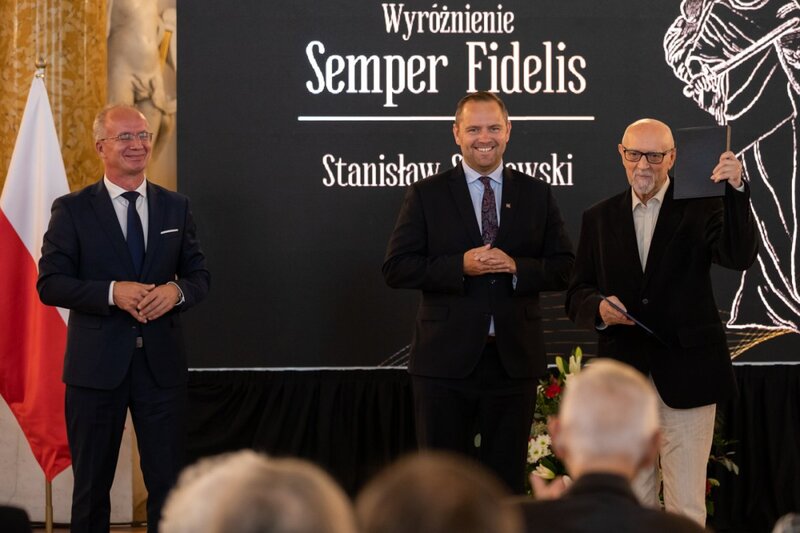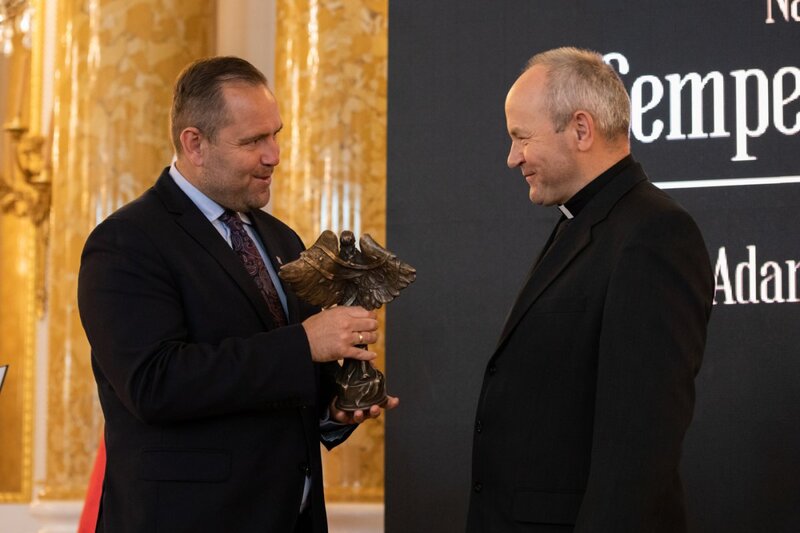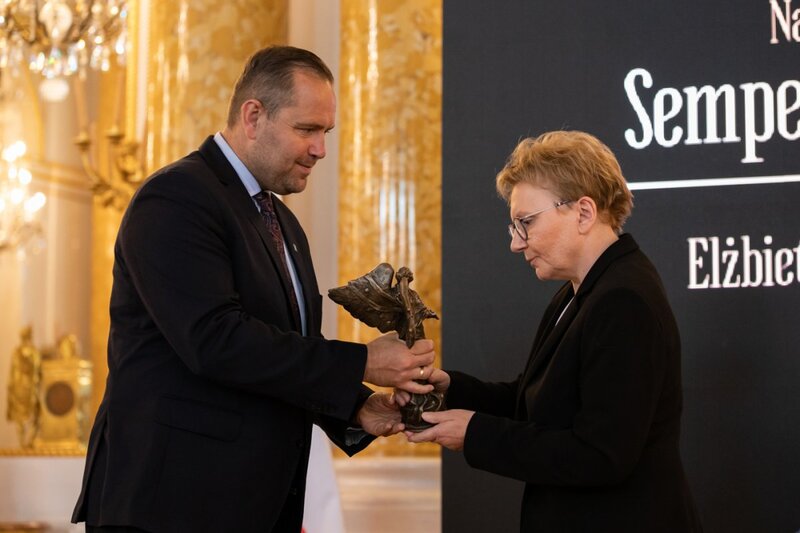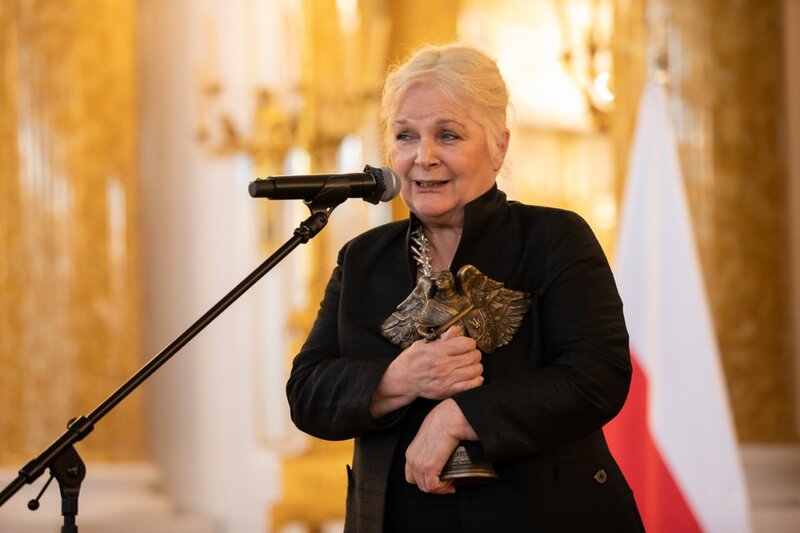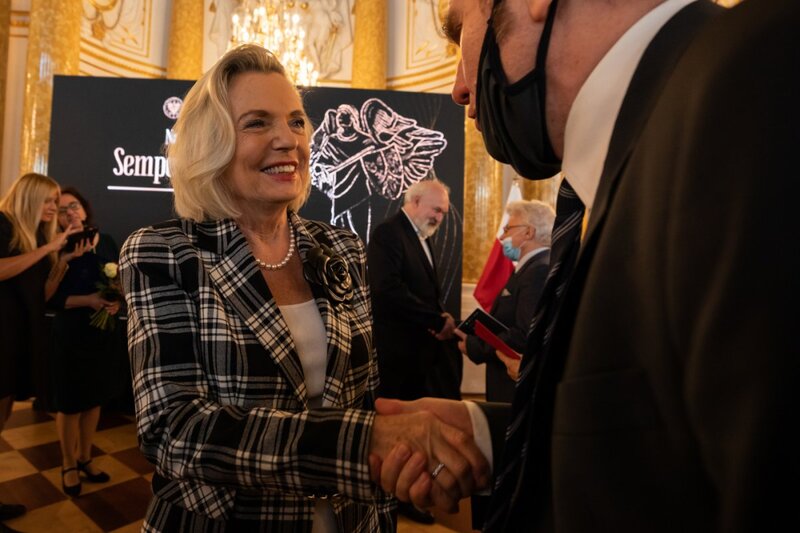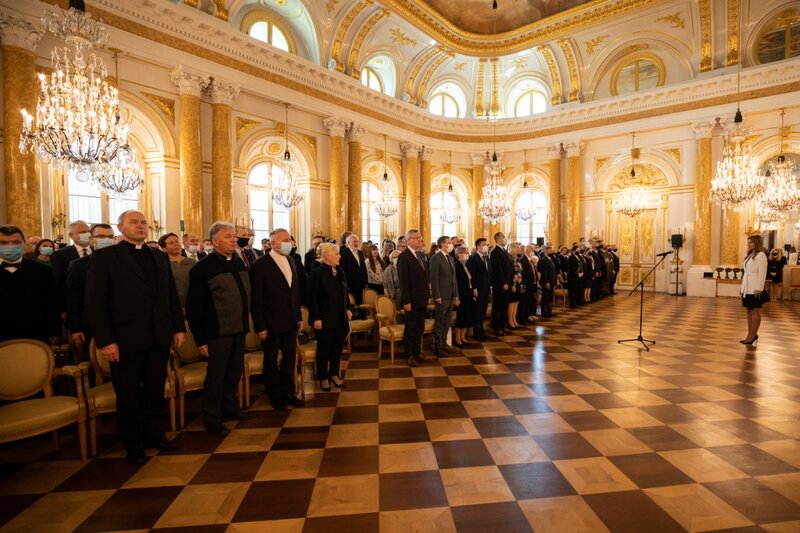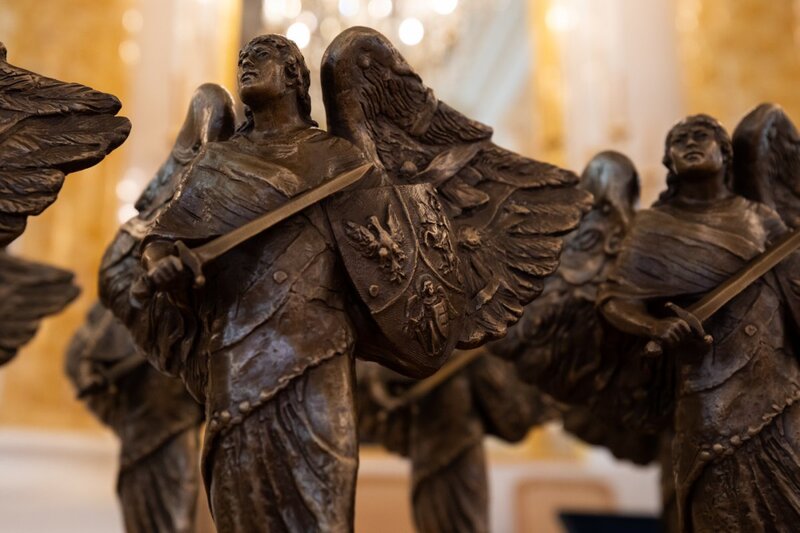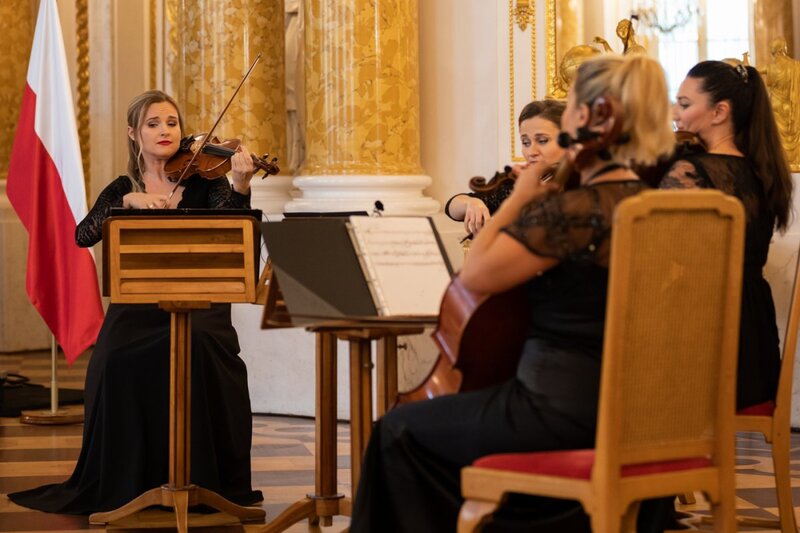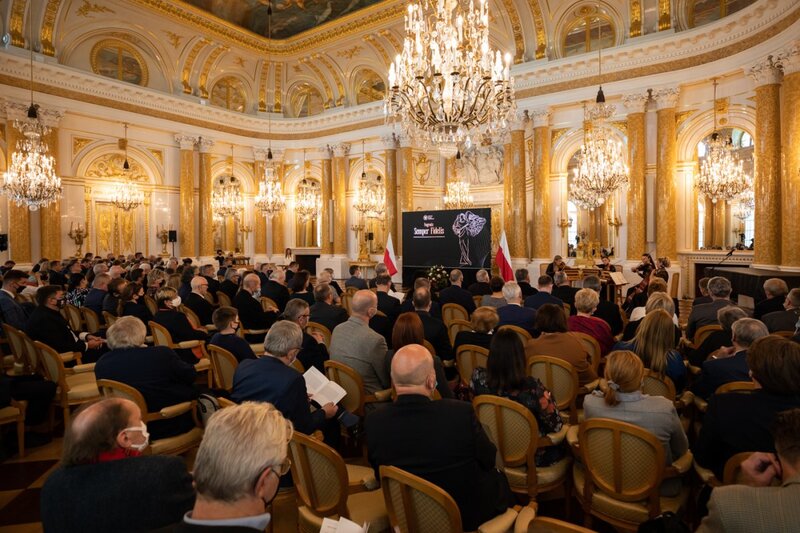The awarding ceremony of the laureates of the second and third edition of the "Semper Fidelis" prize took place on 8 October 2021 at the Royal Castle in Warsaw. The "Semper Fidelis" prize, established by the Institute of National Remembrance, is awarded to persons, institutions and organizations active in commemorating the heritage of the Polish Eastern Borderlands. The event was attended by the President of the Institute of National Remembrance, Karol Nawrocki, Ph.D. and the Deputy President, Krzysztof Szwagrzyk, Ph.D., D.Sc.
Due to the restrictions connected with the Covid 19 pandemic, it was not possible to organize the gala ceremony and award the laureates of the 2nd edition in person. Their profiles were, however, presented at a press conference and can be viewed here.
During this year's ceremony, the winners of two editions – 2020 and 2021 were presented with the statuettes. The President of the Institute of National remembrance greeted the laureates with the following words:
It’s a special day, ladies and gentlemen, because we remember the easternmost territories of the Republic, the Polish Borderlands . . . They stand for the life of many generations of Poles, lived on the land they worked, land they served, land on which their schools and churches stood - but at the same time, land that soaked in Polish blood. It’s something we cannot forget and we haven’t forgotten thanks to your everyday efforts, thanks to your sacrifice . . . Reading your biographies, we see prophets of the Polish spirit.
It’s a real challenge, picking just three faces that would symbolize the Borderlands, but I see the face of Marian Hemar, Lviv-born author, soldier and emigrant who loved Poland by choice; I see the face of Sergiusz Piasecki, Home Army soldier whose story demonstrates that Poland is a mother that accepts her prodigal sons, as long as they’re ready to work for her; I see, unfortunately, also the face of Mirosława Żmudzka, a six-year-old girl brutally murdered by Ukrainian nationalists.
It is you, ladies and gentlemen awarded the Semper Fidelis Prize, and it is your everyday work that allows the heart of Poland still beat in Lviv, Grodno, Zhytomyr, or Kamianets Podilskyi. That heart is bleeding, that heart is weeping, but its love for the Republic of Poland never wanes.
The event took place under the honorary patronage of Prime Minister Mateusz Morawiecki.Minister Michał Dworczyk read out a letter addressed to the participants of the event from Prime Minister Mateusz Morawiecki, in which he wrote:
"The Latin motto "Semper Fidelis" will forever remind us of Lwów, the city that has been, is and will be associated with Poland. (…) The Borderlands are a source of our tradition and identity, all those who devote themselves to restoring the memory of their history, promoting and popularizing their culture deserve special recognition and gratitude of present and future generations of Poles. "
The ceremonial gala can be viewed on IPNtvPL.
The laureates of the third edition:
Father Jan Buras

Father Jan Buras was born on 24 November 1959 in Tarnobrzeg. He graduated from the Higher Theological Seminary in Przemyśl. He was ordained a priest on 24 June 1985. For five years he ministered in various Parishes of the Przemyśl Diocese. He left for Ukraine in 1990 as a response to Archbishop Ignacy Tokarczuk’s plea drawing attention to the lack of priests there. Until 1999, Father Jan Buras took care of the Parishes of Trzcieniec, Balice, Husaków and Radochońce. After returning to Poland, he took over the Parish of Our Lady of Częstochowa in Kuńkowce, and in 2003 he returned to Ukraine. Since 2008, he has been working in Zamłynie, where he set up the Center for Social and Religious Integration. Since 2010, the Center has been organizing the International Icon Plein-airs and summer Polish language courses. In addition to the holding the post of the Director of the Integration Center, Father Buras is also the Vicar General of the Lutsk Diocese and the Parish Priest of the Holy Trinity Parish in Liuboml. From the beginning of his work in Ukraine, Father Jan Buras has been actively involved in activities aimed at the preservation of Polish relics in Volhynia and the Lviv region. Despite the difficulties caused mainly by the Ukrainian administration, he has managed to tidy up several cemeteries and erect crosses commemorating the victims of the Volhynia Massacre.
Father Adam Przywuski
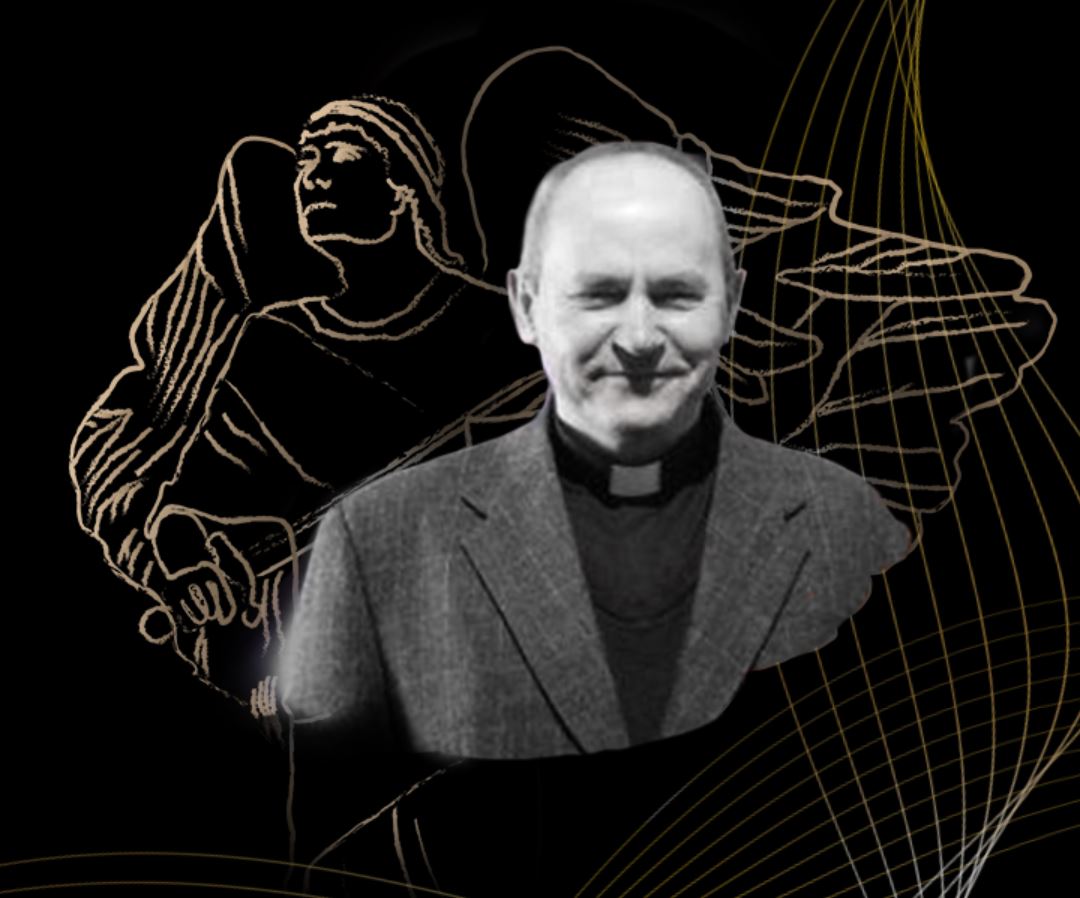
Father Adam Przywuski was born on 14 July 1960 in Biała Podlaska. He was ordained a priest on 11 June 1988. He has been working in Ukraine for twenty years. Initially, he was a lecturer at the Higher Theological Seminary in Gródek, where he taught homiletics, rhetoric and theology. In 2003, he was appointed Pastor of the Assumption of the Blessed Virgin Mary Parish and the Custodian of the Marian Sanctuary in Letychiv, famous for the miraculous image of Our Lady of Letychiv, the Patroness of the New Evangelization. Thanks to his efforts, the post-Dominican monastery buildings turned into a spiritual retreat house and a pilgrim's house, often hosting pilgrims from Poland. Father Przywuski is also a guardian of Polish tradition and culture. He looks after forgotten cemeteries. Father Adam Przywuski has restored the graves of soldiers who died in Letychiv in 1920 and the grave of Poliksena Paderewska, Ignacy Paderewski’s mother. Father Przywuski also engages pupils of Polish schools in the renovation and care of graves. Father Przywuski also looks after former Catholic churches, securing them against devastation and desecration.He is also passionately involved in educational activities, including the presentation of IPN’s exhibitions or organizing events connected with the International Katyn Rally. He eagerly cooperates with numerous Polish organizations in Ukraine.
Elżbieta Rusinko
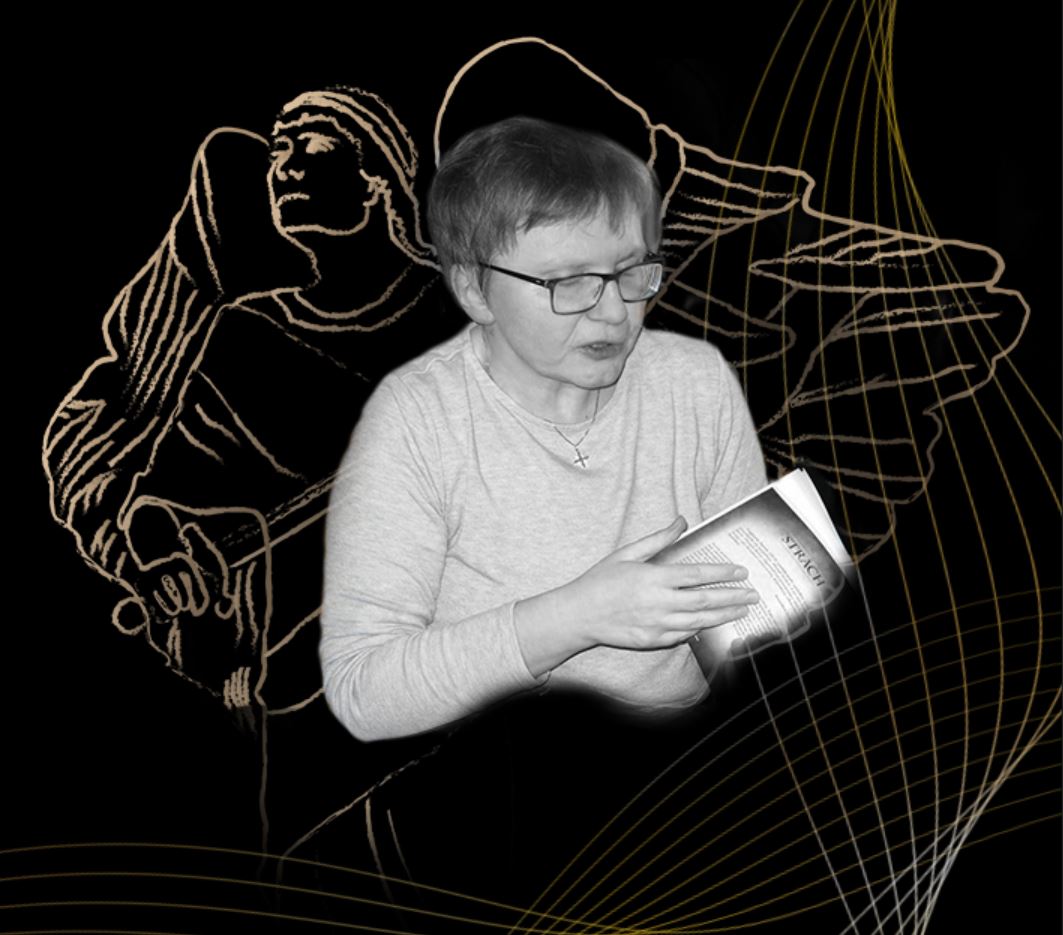
Elżbieta Rusinko was born on 9 September 1966. This history teacher and the principal of the Orlęta Lwowskie Primary School in Roźwienica combines her professional work with active protection and popularization of Polish cultural heritage. Se has served as president of the Society for Enthusiasts of Lviv and Southeastern Borderlands in the town of Jarosław for several years, and chairman of the Eastern Borderlands Heritage association. Thanks to her cooperation with the Institute of National Remembrance and the Warsaw History Meeting House, she initiated in Jarosław regular seminars, lectures and presentations of the history of Poland’s lost territories. On her initiative, the International Festival of Borderland Culture has been organized since 2009; exhibitions, lectures, concerts and meetings with authors, organised within the festiwal framework, attract more and more visitors every year. The aim of the event is to show the national, cultural and religious diversity of the former eastern lands of the Republic of Poland. What is more, Elżbieta Rusinko initiated the Eastern Borderlands Song Festival, the Borderland Book of Jarosław and the Borderland Gallery. Thanks to her, a monument to the Victims of Genocide committed by Ukrainian Nationalists was erected at the Old Cemetery in Jarosław. Besides honoring the memory of the past, Elżbieta Rusinko does not forget about the present, and is committed to helping her compatriots across the eastern border. She was awarded the Centennial of Independence Medal for documenting Polish heritage in the region and for honoring the memory of ancestors and victims of the Volhynian crime.
Danuta Skalska
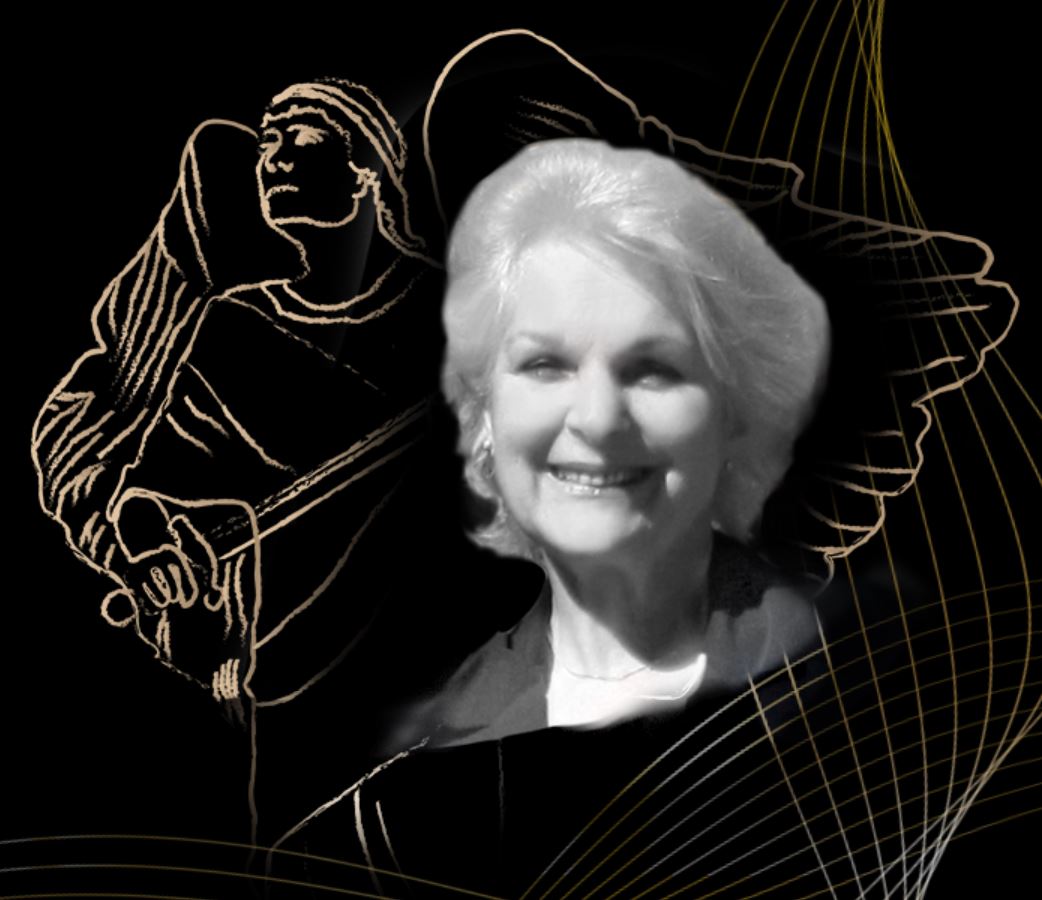
Danuta Skalska, born on 25 June 1945 in Lviv, is the founder and president of the Society of Lviv Enthusiasts in Bytom and the spokesman of the Poles from the Eastern Borderlands World Congress (it is her who organized the Congress meeting at Jasna Góra). On her initiative, the Eastern Borderlands Community Center was established in Bytom, where meetings, lectures and concerts take place, and guests from all over the world arrive to share their stories. Since 2006, she has been hosting the "Lwowska Wave", a show on Polish Radio Katowice, devoted to the history and culture of the Republic of Poland’s lost territories. On air, she explores the issues of identity and roots, her ruminations delivered with unmistakable Eastern Borderlands humor. For years, Danuta Skalska has been involved in the fundraisers for the reconstruction of the Eaglets' Cemetery in Lviv, as well as several charity campaigns, such as "Let the Star Shine for Ukrainian Poles". In the 2004 ranking carried out by the media, she found herself among the hundred most famous women in Silesia. She holds, among others, the Golden Cross of Merit for her teaching work, Polonia Mater Nostra Est award, Bytom city medal, "MUZA 2005" award, as well as numerous prizes from the Polish communities in the Eastern Borderlands and America. Additionally, Danuta Skalska authored a book (Brain on the Rag, or Two Sips of America), a play exploring the problems of Polish emigrants, and writes scripts for the Pacałych cabaret, of which she is the founder. The group performs, among others, popular Lviv songs and émigré works by Feliks Konarski and Marian Hemar.
The Social Committee for the Care of the Rasos Cemetery
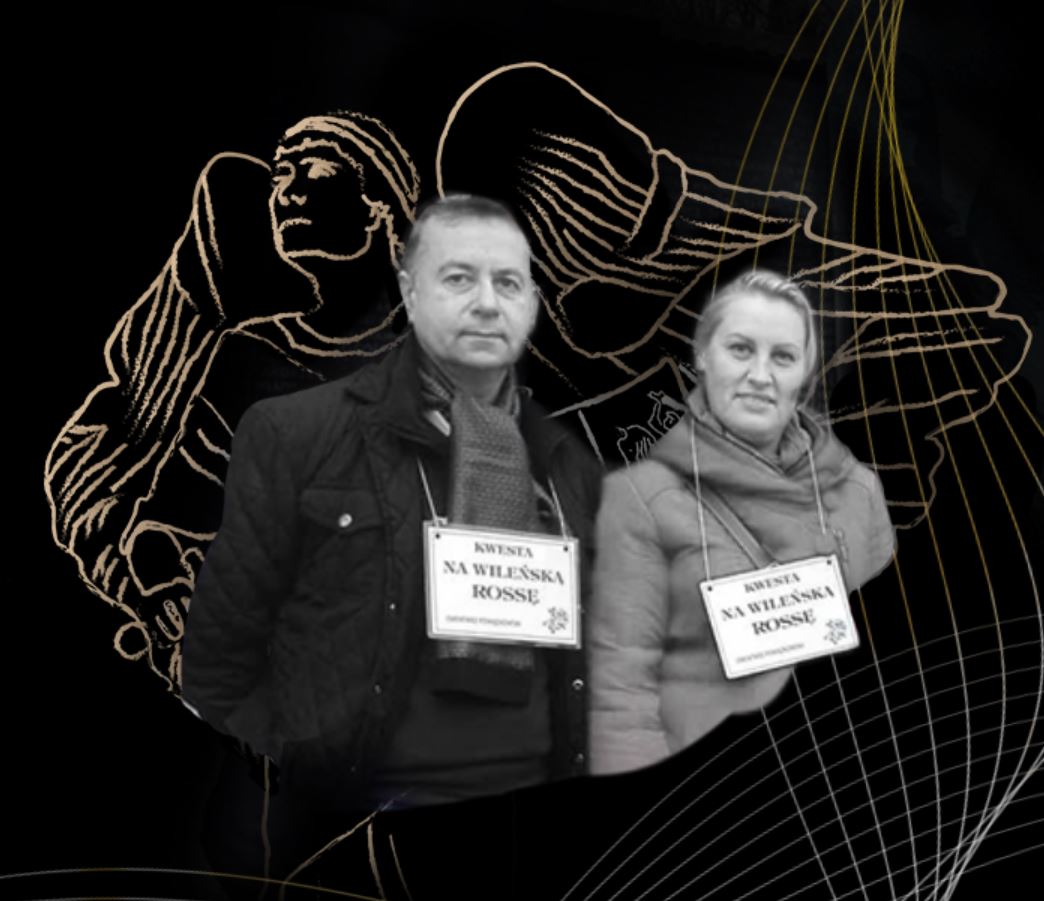
The Social Committee for the Care of the Rasos Cemetery is a Polish non-profit organization in Lithuania, set up to preserve the Rasos Cemetery, the oldest cemetery in Vilnius. The association was established in 1990 upon the initiative of Jerzy Waldorff. The first board was composed of: Alicja Maria Klimaszewska, Halina Jotkiałło, Olgierd Korzeniecki and Jerzy Surwiło. The current President of the Committee is Dariusz Żybort. Thanks to the efforts of the Committee, 174 tombstones have been renovated and 5 new ones have been erected over the course of thirty years. The cemetery complex in Vilnius consists of four parts: the Old and New Rasos, a military cemetery and a separate Mausoleum of the Mother and the Heart of Son. In order to raise funds for the renovation of monuments, members of the organization distribute donation certificates and a collector's medal issued by the Lithuanian Mint. Fundraising activities carried out in cooperation with the Polish Scouting Association in Lithuania have also become a tradition. Moreover, from the beginning of October, the association organizes the annual collection of candles as part of the "A light of memory for the Rasos Cemetery and the Bernardine Cemetery" project. They are later lit on 1 November by members of the Committee and other Polish organizations on forgotten graves. On its website, the organization also runs a section devoted to the history of the cemetery with a list of those resting there and photographic documentation.
Special Mention
Maria and Marek Jastrzębscy
The Competition Jury honored Maria and Marek Jastrzębski, the founders of LTW Publishing House, with the 2021 Special Mention. The publishing house, established in 1996, releases academic and popular science books; as of now, they have over 450 publications in their portfolio, including the complete works of Sergiusz Piasecki, the first complete edition of Antoni Słonimski's 1927-1939 Weekly Chronicles and works by Marian Hemar, Antoni Ferdynand Ossendowski or Florian Czarnyszewicz. Part of the mission of Maria and Marek Jastrzębski is to bring back valuable books that have not been reprinted for various reasons. To that end, the LTW Publishing House put out, among others, all fourteen volumes of Polish Wonders – a series popular in the interwar period, which disappeared from libraries during the communist era. The publishing house is also offering a rich collection of studies on the recent history of Poland.
Media partners: TVP Polonia, Polskie Radio, Rzeczpospolita, dzieje.pl, wpolityce.pl, Kurier Galicyjski, Kurier Wileński, Kresy24.pl
What is the "Semper Fidelis" prize?
The Institute of National Remembrance established the "Semper Fidelis" Prize in 2019. It is an honorary distinction annually awarded to individuals, institutions and social organizations whose public activity coincides with the statutory objectives of the IPN, for their particularly active participation in commemorating the heritage of the Polish Eastern Borderlands both in Poland and abroad.
The winners are selected by the Prize Committee chaired by the President of the Institute of National Remembrance. During the award ceremony, the laureates receive a commemorative statuette and a diploma. The committee also may award one post-mortem prize each year.
The educational value of the prize is also worth mentioning. It serves as a means of disseminating knowledge about what Poland lost after 1945. And, undoubtedly, the loss was enormous. The change of borders after 1945 meant that part of the centuries-old heritage of the Republic of Poland was included into the territories of today's Ukraine, Belarus and Lithuania. These lands, however, are still the source of our national identity, tradition and culture. Persons devoted to restoring and preserving the memory of the history of the Borderlands deserve special recognition and gratitude on the part of not only present but also future generations of Poles.
